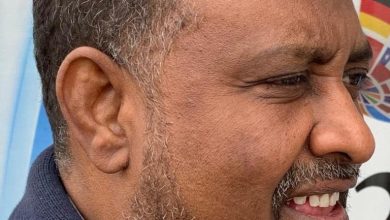Restored article text Makki Sinada.. more than one life?!!

Alsir Alsayed
The well-known activist in the fields of politics and women’s fields, Professor / Nour Mohammed Osman, told me when I hosted her with others on the “Silk Handkerchief” program presented by the National Radio on one of the holidays, while describing the period in which their awareness opened as women in the beginning of their lives about how she and many girls of her generation used to go to the National Theater, which she described as the place that taught her a lot, to watch “Makki Sinada” in the play Al-Mandara or Suhair’s Engagement or other plays, that , these are her words literally,we used to deliberately wait and striving to shake Makki Sinada’s hands. This testimony is an eloquent indication for us, the subsequent generations of dramatists, and perhaps for me in particular, for the value and position of Makki Sinada in the process of Sudanese theater and Sudanese drama, a position that some of us did not appreciate as we should for different reasons, most of which were based on good intentions. As one of the theatrical generations following Makki Sinada and among those who were given the opportunity to watch him on television, heard him on the radio as an actor, and director see him in the theater as an actor and director. I was always thinking and wondering about how Makki chooses the roles he plays. Perhaps the motivation for this thinking and question is the abundance of these characters, their diversity, and their differences. Some of them were of the type of dramatic characters that can be described as one-dimensional, and some of them are complex characters, some of whom range between this and that, and I will never forget here, as long as I live, the first time I saw him as an actor on the national stage, and that was in the play “Safar Al-Jaffa.” I will never forget that moment as I watched him take the play to the highest levels of conflict and tension, and I mean that here the scene in which he stands, in front of the train, as an indication to stop it , so that it would not take their children to the city, just as it took his son, “Hassan,” who went to the city and denied his family and no longer asked about them, so his journey was the journey of Jaffa (disdain). Then days passed and I heard him in the play “El-Tagree El-Akheer“(The Last Report) that was directed by Salah Al-Din Al-Fadil, and it was assigned to us at the Higher Institute of Music and Drama within the subject of the art of radio drama… In the El-Tagree El-Akheer, I saw him, and I do not mean I heard him, as he was skillful enough, making you see him, so I felt the difference between his character in Safar Al-Jaffa, which is the character of a village man and a simple farmer, and his character in El-Tagree El-Akheer, the complex personality of a young man from the city educated who can be described as suffering from a Schizophrenia. Nevertheless, he was highly cultured and aware of what was going on in his society and the world around him. He was “Khalil Ibrahim Jarelnabi,” as Makki Sinada expressed to us in Safar Al-Jaffa until that moment when his spirit was converted skillfully into that of the actor. Here he infiltrates and takes us into the worlds of Khalil’s character and its fluctuations. This character, who moves at intersections of time between the past and the present, and intersections between imagination and reality, can only be a character standing on the brink of madness, and this is the brink where Makki stopped us as he takes us high with great professionalism. In the management of the sound and in the skill of the performance, then comes “Suhair’s Engagement Play” at the National Theater, and I watch him for the third time as he plays the character of Suhair’s father, who is “Khalil”… the man who spent part of his life as a government employee under the Anglo-Egyptian colonialism.. the man who intended to lose consciousness and even leaves reality because of drunkenness. He is a first-class addict, and because of this addiction he caused the failure of the engagement of his only daughter, Suhair. But on the other hand, he worked to expose the falsity of social relations and expose the pattern of puritanical religiosity and the oppression it causes of women and the confiscation of any opportunity for tolerance and special rights. The Khalil’s character, as embodied by Makki Sinada, skillfully embodies what is known as black comedy. Despite the tragic end to his daughter’s private future, and despite the failure and suffering Khalil experienced, he was, on many occasions, a source of hope and joy for his daughter and a repository of many correct judgments and ideas that make the viewer sympathized with him and sided with him in many situations. These initial and few views of the actor Makki Sinada are what made me search for this rich archive and get to know his characters, especially in the radio drama, in which Makki Sinada occupies a distinguished position in quantity and quality. To arrive at the conclusion that the actor Makki Sinada lived more than one life through his embodiment of these various characters and at the same time giving more than one life to those characters he embodied, and here I stand at this entrance with the promise of more details about the many and varied lives of actor Makki Sinada.


